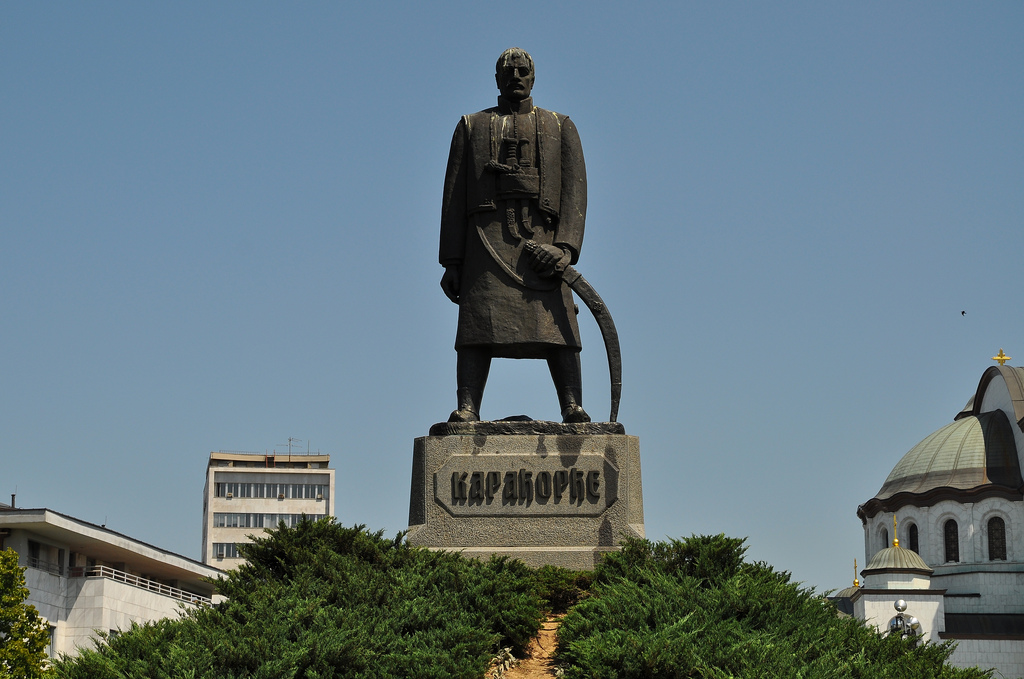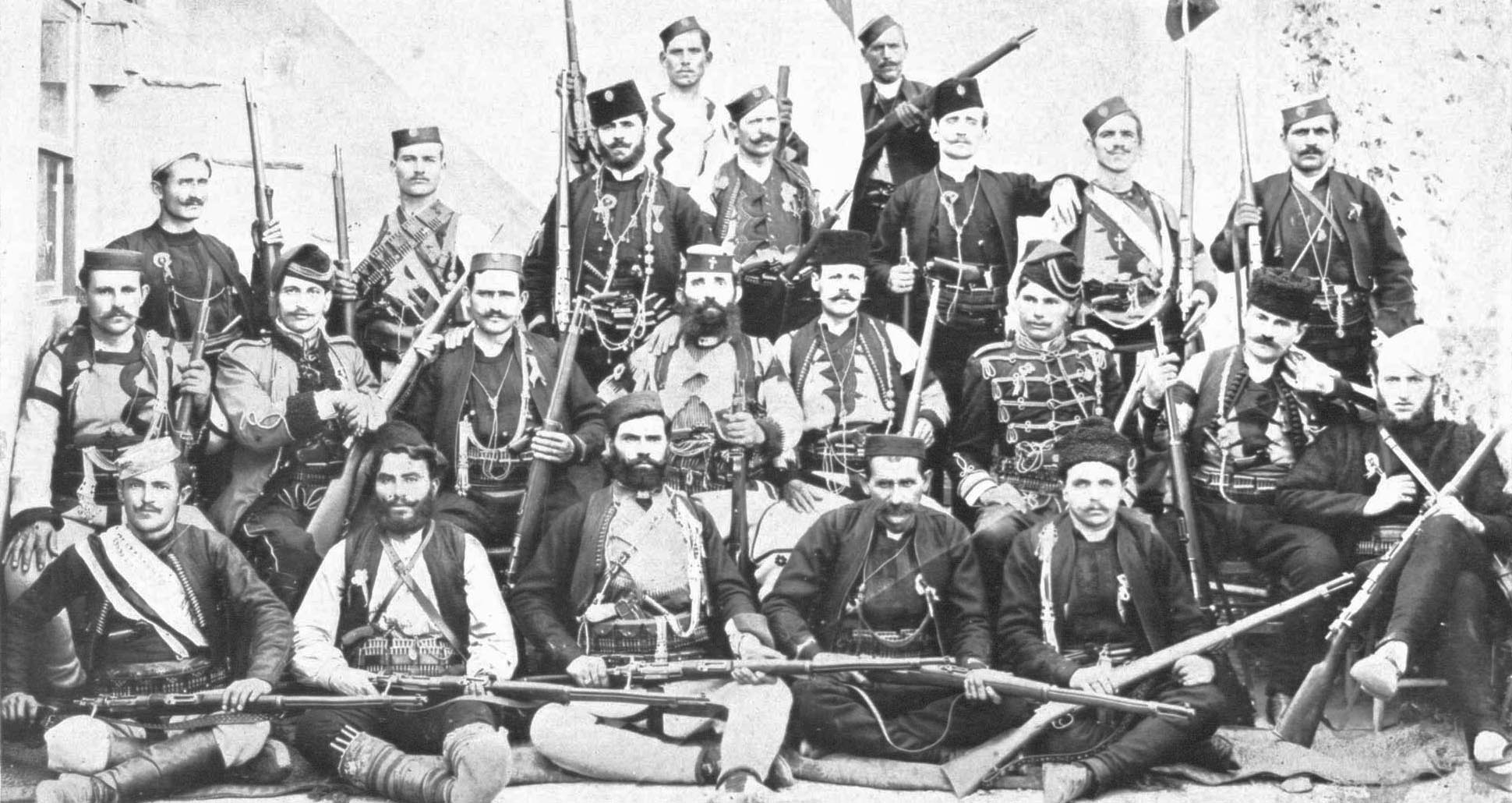|
Milorad Gođevac
Milorad Gođevac ( sr-cyr, Милорад Гођевац, 1 March 1860 – 21 September 1933) was the organizer of the Serbian Chetnik Organization, a doctor by profession. Life Born in Valjevo, Principality of Serbia, he finished the First Belgrade Gymnasium and finished medicine at the University of Vienna in 1889. He was the organizer of the Serbian armed action in South Serbia and Macedonia and founder of the first Volunteer Board. The Chief Staff of the Chetnik Organization (the Serbian Committee) was established in 1902. The members were, among others, Gođevac, Luka Ćelović, Vasa Jovanović, Žika Rafailović, Nikola Spasić and Ljuba Kovačević. See also * Serb revolutionary organizations *List of Chetnik voivodes This is a list of Chetnik voivodes. VoivodeAlso spelled "voievod", "woiwode", "voivod", "voyvode", "vojvoda", or "woiwod" () ( Old Slavic, literally "war-leader" or "war-lord") is a Slavic as well as Romanian title that originally denoted the prin ... [...More Info...] [...Related Items...] OR: [Wikipedia] [Google] [Baidu] |
Milorad Gođevac
Milorad Gođevac ( sr-cyr, Милорад Гођевац, 1 March 1860 – 21 September 1933) was the organizer of the Serbian Chetnik Organization, a doctor by profession. Life Born in Valjevo, Principality of Serbia, he finished the First Belgrade Gymnasium and finished medicine at the University of Vienna in 1889. He was the organizer of the Serbian armed action in South Serbia and Macedonia and founder of the first Volunteer Board. The Chief Staff of the Chetnik Organization (the Serbian Committee) was established in 1902. The members were, among others, Gođevac, Luka Ćelović, Vasa Jovanović, Žika Rafailović, Nikola Spasić and Ljuba Kovačević. See also * Serb revolutionary organizations *List of Chetnik voivodes This is a list of Chetnik voivodes. VoivodeAlso spelled "voievod", "woiwode", "voivod", "voyvode", "vojvoda", or "woiwod" () ( Old Slavic, literally "war-leader" or "war-lord") is a Slavic as well as Romanian title that originally denoted the prin ... [...More Info...] [...Related Items...] OR: [Wikipedia] [Google] [Baidu] |
Serb Revolutionary Organizations
This list includes revolutionary organizations aimed at liberating and unifying Serb-inhabited territories into the historical national state of Serbia—it only includes organizations established after the Principality of Serbia (1815) and before the establishment of Second Yugoslavia (1945). See also *Serbian Revolution The Serbian Revolution ( sr, Српска револуција / ''Srpska revolucija'') was a national uprising and constitutional change in Serbia that took place between 1804 and 1835, during which this territory evolved from an Ottoman prov ... References {{Serbia-hist-stub Revolutionary organizations Revolutionary organizations Serb organizations ... [...More Info...] [...Related Items...] OR: [Wikipedia] [Google] [Baidu] |
1860 Births
Year 186 ( CLXXXVI) was a common year starting on Saturday (link will display the full calendar) of the Julian calendar. At the time, it was known as the Year of the Consulship of Aurelius and Glabrio (or, less frequently, year 939 ''Ab urbe condita''). The denomination 186 for this year has been used since the early medieval period, when the Anno Domini calendar era became the prevalent method in Europe for naming years. Events By place Roman Empire * Peasants in Gaul stage an anti-tax uprising under Maternus. * Roman governor Pertinax escapes an assassination attempt, by British usurpers. New Zealand * The Hatepe volcanic eruption extends Lake Taupō and makes skies red across the world. However, recent radiocarbon dating by R. Sparks has put the date at 233 AD ± 13 (95% confidence). Births * Ma Liang, Chinese official of the Shu Han state (d. 222) Deaths * April 21 – Apollonius the Apologist, Christian martyr * Bian Zhang, Chinese official and ... [...More Info...] [...Related Items...] OR: [Wikipedia] [Google] [Baidu] |
People From The Kingdom Of Serbia
A person ( : people) is a being that has certain capacities or attributes such as reason, morality, consciousness or self-consciousness, and being a part of a culturally established form of social relations such as kinship, ownership of property, or legal responsibility. The defining features of personhood and, consequently, what makes a person count as a person, differ widely among cultures and contexts. In addition to the question of personhood, of what makes a being count as a person to begin with, there are further questions about personal identity and self: both about what makes any particular person that particular person instead of another, and about what makes a person at one time the same person as they were or will be at another time despite any intervening changes. The plural form "people" is often used to refer to an entire nation or ethnic group (as in "a people"), and this was the original meaning of the word; it subsequently acquired its use as a plural form of per ... [...More Info...] [...Related Items...] OR: [Wikipedia] [Google] [Baidu] |
Serbian Diplomats
Serbian may refer to: * someone or something related to Serbia, a country in Southeastern Europe * someone or something related to the Serbs, a South Slavic people * Serbian language * Serbian names See also * * * Old Serbian (other) * Serbians * Serbia (other) * Names of the Serbs and Serbia Names of the Serbs and Serbia are terms and other designations referring to general terminology and nomenclature on the Serbs ( sr, Срби, Srbi, ) and Serbia ( sr, Србија/Srbija, ). Throughout history, various endonyms and exonyms have bee ... {{Disambiguation Language and nationality disambiguation pages ... [...More Info...] [...Related Items...] OR: [Wikipedia] [Google] [Baidu] |
Military Personnel From Valjevo
A military, also known collectively as armed forces, is a heavily armed, highly organized force primarily intended for warfare. It is typically authorized and maintained by a sovereign state, with its members identifiable by their distinct military uniform. It may consist of one or more military branches such as an army, navy, air force, space force, marines, or coast guard. The main task of the military is usually defined as defence of the state and its interests against external armed threats. In broad usage, the terms ''armed forces'' and ''military'' are often treated as synonymous, although in technical usage a distinction is sometimes made in which a country's armed forces may include both its military and other paramilitary forces. There are various forms of irregular military forces, not belonging to a recognized state; though they share many attributes with regular military forces, they are less often referred to as simply ''military''. A nation's military may ... [...More Info...] [...Related Items...] OR: [Wikipedia] [Google] [Baidu] |
Serbian Nationalists
Serbian nationalism asserts that Serbs are a nation and promotes the cultural and political unity of Serbs. It is an ethnic nationalism, originally arising in the context of the general rise of nationalism in the Balkans under Ottoman rule, under the influence of Serbian linguist Vuk Stefanović Karadžić and Serbian statesman Ilija Garašanin. Serbian nationalism was an important factor during the Balkan Wars which contributed to the decline of the Ottoman Empire, during and after World War I when it contributed to the dissolution of the Austro-Hungarian Empire, and again during the breakup of Yugoslavia and the Yugoslav Wars of the 1990s. After 1878, Serbian nationalists merged their goals with those of Yugoslavists, and emulated the Piedmont's leading role in the ''Risorgimento'' of Italy, by claiming that Serbia sought not only to unite all Serbs in one state, but that Serbia intended to be a South Slavic Piedmont that would unite all South Slavs in one state known as Yu ... [...More Info...] [...Related Items...] OR: [Wikipedia] [Google] [Baidu] |
List Of Chetnik Voivodes
This is a list of Chetnik voivodes. VoivodeAlso spelled "voievod", "woiwode", "voivod", "voyvode", "vojvoda", or "woiwod" () ( Old Slavic, literally "war-leader" or "war-lord") is a Slavic as well as Romanian title that originally denoted the principal commander of a military force. It derives from the word ''vojevoda'', which in early Slavic meant the ''bellidux'', i.e. the military commander of an area, but it usually had a greater meaning. Among the first modern-day voivodes was Kole Rašić, a late 19th-century Serb revolutionary and guerrilla fighter, who led a cheta of 300 men between Niš and Leskovac in Ottoman areas during the Serbo-Turkish War (1876–1878). The others were Rista Cvetković-Božinče, Čerkez Ilija, Čakr-paša, and Spiro Crne. Jovan Hadži-Vasiljević, who knew Spiro Crne personally, wrote and published his biography, ''Spiro Crne Golemdžiojski'', in 1933. Commanders of Old Serbia and Macedonia (1903–1912), Balkan Wars * Kosta Milovanović-P ... [...More Info...] [...Related Items...] OR: [Wikipedia] [Google] [Baidu] |
Ljuba Kovačević
{{disambig, geo, given name ...
Ljuba may refer to: * Ljuba (given name), a Slavic given name * Ljuba, Serbia, a village in Syrmia, Vojvodina * 1062 Ljuba, an asteroid See also * Ljubav (other) Ljubav may refer to: * ''Ljubav'' (Ekatarina Velika album), 1987 * ''Ljubav'' (Trigger album), 2007 {{Disambiguation ... [...More Info...] [...Related Items...] OR: [Wikipedia] [Google] [Baidu] |
Serbian Chetnik Organization
Serbian may refer to: * someone or something related to Serbia, a country in Southeastern Europe * someone or something related to the Serbs, a South Slavic people * Serbian language * Serbian names See also * * * Old Serbian (other) * Serbians * Serbia (other) * Names of the Serbs and Serbia Names of the Serbs and Serbia are terms and other designations referring to general terminology and nomenclature on the Serbs ( sr, Срби, Srbi, ) and Serbia ( sr, Србија/Srbija, ). Throughout history, various endonyms and exonyms have bee ... {{Disambiguation Language and nationality disambiguation pages ... [...More Info...] [...Related Items...] OR: [Wikipedia] [Google] [Baidu] |
Nikola Spasić
Nikola Spasić ( sr-cyr, Никола Спасић; 2 November 1838 in Belgrade – 28 November 1916 in Corfu) was a Serbian businessman, benefactor, humanitarian, and one of the leaders of the Serbian Chetnik Organization in Old Serbia and Macedonia. He was the president of the Board of Directors of the Belgrade Exchange in 1903 and the initiator-founder-builder of the Nikola Spasić Endowment Building in Belgrade, which had a slightly bigger founding capital then the Nobel Foundation. He also initiated and financed the construction of four major edifices in Knez Mihailova Street, the third of which were built immediately after the First Balkan War, such as the Grand Passage, designed by Nikola Nestorović."Трећи сектор у Србији - стање и перспективе“ у: ''Непрофитни сектор у Србији и Црној Гори'', Београд, 2002. Biography Nikola Spasić was born to a poor Serbian family which moved to Belgrade fro ... [...More Info...] [...Related Items...] OR: [Wikipedia] [Google] [Baidu] |


_1938.jpg)

